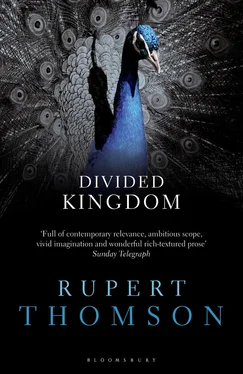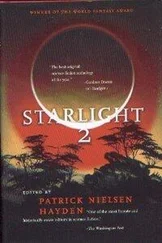The thought of her has me trembling, as if with cold.
I want to hear my name on her tongue. I want to feel her skin on mine, my body mingling illegally with hers. I want to learn her off by heart. You’re not going to forget me again, are you?
I’ll never turn my back on her. I promise.
The lake twitches below me, restless, like a dog dreaming. A broken branch floats on the water, its buds already open. In the east I hear the wind rise.
Now she’ll come.
And I’m standing in the truck again, with strangers all around me and a light rain falling, and I can see my mother and father on the road, and I call out to them.
It’s all right. I’m going to be all right.
I would like to thank the British Library, the late Fred Clements, the staff at the Darlington Railway Museum, the staff at the Dorchester Hotel, Di Harrison, the staff at Lanercost Priory, the staff at the Museum of Mining in Wakefield, the late Professor Fred Norbury, John and Maria Norbury, Dr Emilie Savage-Smith, Rupert and Sophie Scott, Stephanie Stannier, the staff at Stump Cross Caverns, Jyoti Tamana, the staff at the Tourist Information Centres in Darlington and Lewes, Gray Watson, the Wellcome Library for the History and Understanding of Medicine, and the Reverend John Wraithte. Particular thanks go to Dr Faye Getz for her help in guiding me through the intricacies of humoral theory.
I am indebted to Beatrice Monti della Corte for her kindness and inspiration at Santa Maddalena, where the process of editing Divided Kingdom began.
Finally, my immense gratitude goes to Liz Calder, Gary Fisketjon, Katharine Norbury, Alexandra Pringle, Peter Straus, Mary Tomlinson, and Binky Urban. All seven helped significantly, each in their own unique way. This book would not be what it is without their invaluable encouragement and their undoubted brilliance and skill.
The following books proved especially useful: Freedom and Its Betrayal: Six Enemies of Human Liberty by Isaiah Berlin (2002), Galen on Bloodletting by Peter Brain (1986), The Druid Animal Oracle by Philip and Stephanie Carr-Gomm (1996), A Generation Divided: German Children and the Berlin Wall by Thomas A. Davey (1987), Ley Lines by J. Havelock Fidler (1983), Lee Kuan Yew’s Singapore by T. J. S. George (1973), Medicine in the English Middle Ages by Dr Faye Getz (1998), Western Medical Thought from Antiquity to the Middle Ages edited by Mirko D. Grmek (1998), Handbook of Psychological Assessment by Gary Groth-Marnat (1997), Secret Teaching of All Ages: An Encyclopedic Outline of Masonic, Cabbalistic, Hermetic and Rosicrucian Philosophy by Manly P. Hall (1999), Happiness through Tranquillity by Richard Hibler (1984), Nature of Man by Hippocrates, translated by W. H. S. Jones (1931), Saturn and Melancholy by Raymond Klibansky (1964), S,M,L,XL by Rem Koolhaas and Bruce Mau (1995), The Celtic Book of the Dead by Caitlin Matthews (1992), Narratives of Guilt and Compliance by Barbara Muller (1999), Paracelsus — An Introduction to Philosophical Medicine by Walter Pagel (1958), Iconology — A Collection of Emblematic Figures by George Richardson (1778), Medieval and Early Renaissance Medicine by Nancy Siraisi (1990), The Hippocratic Tradition by W. D. Smith (1979), Scientific Tourist through England by Thomas Walford (1818), The Optick Glass of Humours by T. Walkington, Master of Artes (1631), The Ley Hunter’s Manual by Alfred Watkins (1983), and Amnesty International Report (Nov/Dec 1978).
RUPERT THOMSONis the author of eight highly acclaimed novels, of which Air and Fire and The Insult were shortlisted for the Writer’s Guild Fiction Prize and the Guardian Fiction Prize respectively. His most recent novel, Death of a Murderer , was shortlisted for the 2008 Costa Novel Award. His memoir This Party’s Got to Stop was published in 2010.












